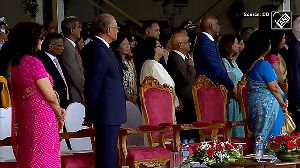The Karnataka high court on Monday indicted 11 publications for contempt for their reportage about a sex scandal at a Mysore resort allegedly involving three judges of the court.
A full bench of the high court comprising Justices T S Thakur, H L Dattu and V G Sabhahit charged the publications with publishing reports without due care, reasonable basis and verification of facts, thereby "scandalising the court" and lowering its authority.
The publications were charged with an offence punishable under section 12 of the Contempt of Court Act within the meaning of section 2(C) of the act.
The 11 publications are The Times of India, The New Indian Express, Deccan Herald, The Week, Vijaya Karnataka, Kannada Prabha, Prajavani, Udayavani, Nota, Lankesh Patrike and Agni. The accused included the editors, printers, publishers and reporters of these publications.
Three respondents were not present. Those present pleaded not guilty. The trial will begin on March 27.
As far as the reports published in The Hindu and Outlook newsmagazine on the same subject were concerned, the judges held that they did not see any reason to proceed further, dropped the contempt charges against them, and discharged them.
Counsel for the various publications indicated that they would file special leave petitions in the Supreme Court challenging the high court's order. But the bench rejected their plea to defer framing of charges for a few weeks.
Reports of the alleged scandal had made national headlines late last year, following which then chief justice of India S P Bharucha set up a committee of three judges from different high courts to look into it. The committee gave a clean chit to the three Karnataka high court judges.
The bench observed that criticism of a judge or the judiciary as an institution sometimes stepped "far beyond the limits of legitimacy", making it difficult to ignore such criticism with "yogic detachment".
"That is because what is at stake in such cases is not the name or the reputation of an individual judge, but the confidence of the people in the administration of justice by the courts of law," it said.
The bench observed that neither judges nor the judiciary as an institution is above criticism. "Where, however, criticism goes beyond the legitimate limits and brings the institution into disrepute or ridicule, as for instance by scandalising the institution, action in contempt is not only permissible but necessary to ensure that the confidence of the people in the constitutional mechanism provided for administration of justice is not impaired."
Viewed in that backdrop, the court held that the reports in the 11 publications were prima facie contemptuous, because they suggested that the administration of justice in the Karnataka high court was in weak and morally corrupt hands. "We find it difficult to accept such a vilification campaign as legitimate criticism of the working of the institution," the bench said.
PTI






 © 2025
© 2025